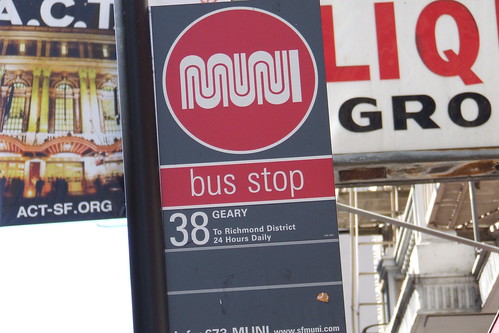
The local press keeps pressing the word about Muni; there is the real possibility of a fare hike, and we already know that the start of the new fiscal year (July 1st) will be the $55 adult Muni fast pass.
Even Tom Nolan, who is the head of the board of directors of the SFMTA won't be that surprised if the fast pass rate goes even higher than $55. That's not good news around here.
I think SFMTA/Muni should start thinking creatively about their adult fast passes.
Our current fast pass provides adults:
- Unlimited rides on all Muni vehicles: buses (regular, limited, and express), metro, historic trolleys, and Cable Cars.
- Unlimited rides for BART service within San Francisco (between Embarcadero and Balboa Park).
- Reduced fare for "special event" service (CultureBus and Candlestick).
- 3-day grace period after the end of the month.
I propose Muni should create three different passes with three different price ranges. AC Transit has two different "31 day" passes which covers local (East Bay) and transbay (local service and transbay service). Muni should complicate their pass structure a little bit more:
The "basic" pass is offered at a lower price. It allows:
- Unlimited rides on regular and limited bus lines, metro, and historic streetcar.
- No BART service, no express service (the 9X doesn't count either), and no cable cars.
- No discount for "special event service."
- No 3-day grace period.
- Unlimited rides on all Muni vehicles: buses (regular, limited, and express), metro, historic trolleys, and Cable Cars.
- Unlimited rides for BART service within San Francisco (between Embarcadero and Balboa Park).
- Reduced fare for "special event" service (CultureBus and Candlestick).
- 3-day grace period after the end of the month.
- Unlimited rides on all Muni vehicles: buses (regular, limited, and express), metro, historic trolleys, and Cable Cars.
- Unlimited rides for BART service within San Francisco (between Embarcadero and Balboa Park) and INCLUDES Daly City station access (perfect for SFSU students).
- Pass gives full fare credit for all "special event" service (flash and go).
- 3-day grace period after the end of the month.
If Muni wants to argue "it will cost more to print and produce!" Then why not offer the most expensive and least expensive passes to be for Translink card users only? Translink technicians just fix the programming to sell the three passes and the Muni operators won't have confusion on which is the basic, regular, and premium pass. Plus, people won't bicker at BART agents at Daly City because their Translink card is the only way to gain access to that entry/exit point.
If Muni wants to argue that Daly City residents will abuse the premium pass to save on BART rides to commute to downtown (they do have a huge parking lot), then restrict the "premium" pass sales to local SF residents. Translink knows what city you live in when you register, so it will be easy to regulate it.
And I don't understand why Muni doesn't allow more local universities and colleges participate in a "class pass" program. The only university I know in the city that does this is USF.
Cal Berkeley offers a pass for their students:
- Students are automatically given a "Class Pass" every semester, which is charged through their campus tuition/fees at $58.50 per month and provides unlimited access to all AC Transit services, including transbay.
For example:
--Regular Muni pass is $50/month.
--Mandatory class pass is $30/month (student fee paid to university).
--Assume a student population with 50% driving to campus everyday and 50% taking the bus to campus.
--In the end, the value of a class pass when using the money from the non-public transit users, makes each pass worth $60 a month. It looks attractive to students that they are getting a 50% discount, but Muni makes a profit. If Muni wants to make more money, they just have to raise it, but make it lower than $50.
--But if the driver population drops and more are taking transit, the pass price goes higher to compensate.
1 comment:
The class pass is actually not a monthly fee. It's charged once a semester. http://pt.berkeley.edu/pay/transit/classpass... That would be bad ass if college students could get this deal.
Post a Comment